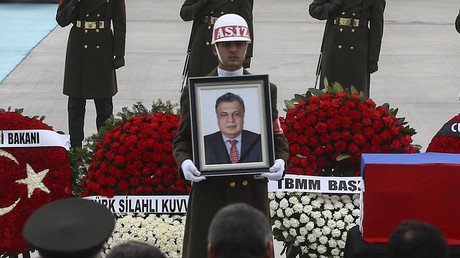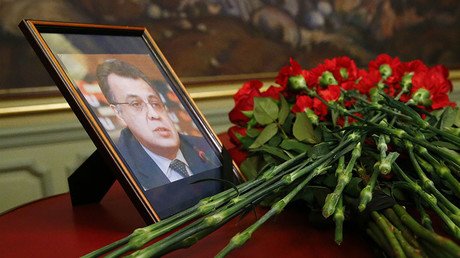‘Turkey, Russia and Iran in best position to negotiate Syria peace’ – former US ambassador
The assassination of ambassador Karlov will unlikely damage relations between Russia and Turkey, who, alongside Iran, have a good chance of succeeding in the resolution of the Syrian conflict where the UN failed, former US ambassador to Croatia Peter Galbraith told RT.
READ MORE: Who profits from Turkey’s 'Sarajevo moment'?
RT: Both Russia and Turkey said that the ambassador killing was aimed at destabilizing ties between the two countries. Who would benefit from that destabilization?
Peter Galbraith: It’s not clear what all the motives, at least from the public material, of the murderer were. Whether it was thought out as intending to destabilize relations or simply taking revenge … for what he considered to be Russia’s role. It’s not clear at least again from the public material whether he was a part of a terrorist organization, or just an individual acting on his own.
If his goal was to destabilize relations, I don’t think he was going to succeed, because this was a blow struck both at Russia and Turkey. Every country has an obligation to protect the diplomats that are on its territory. So, the killing is something that is also very very damaging to Turkey. And so they have a common goal in wishing to condemn it and wishing to deal with it if it turns out to be an act of terrorism.
RT: After the assassination the media looked at this in a certain way, focusing on the suffering of people in Aleppo. Is such sort of narrative in some way trying to explain or even somewhat justify the murder?
PG: I think it is an effort to explain it, and based on what the killer said he does seem to have been motivated by what happened in Aleppo. But it’s very important that any commentary does not excuse the murder of the ambassador.
Countries have to conduct diplomatic relations, ambassadors carry out the instructions from their capitals. In some sense it was a blow struck at a symbol of Russia, certainly a representative of Russia. But Andrey Karlov was a human being, and I think it’s really important to remember [both] that and the loss that has been felt by his family, his colleagues.
READ MORE: ‘Russian ambassador assassination is quantum jump in terrorism’
And the damage it does to the international system. It turns out to be the first Russian ambassador who has been killed since 1927, but we’ve had quite a number of American ambassadors killed over the last thirty or forty years. Many more ambassadors than generals. And it underscores how risky it is, even if you have a lot of security which American ambassadors have. There’s no real protection against this kind of act.
RT: What do you think of the new trilateral format of talks between Russia, Turkey and Iran?
PG: Turkey, Russia and Iran are the three countries, that have the power to make a settlement. Obviously, Iran and Russia have been big supporters of the Assad government in Syria, and Turkey has been the most aggressive supporter for its opponents. Turkey also bears some responsibility for the radical extremists, that it simply let through, pass through Turkey on the way to Syria, which have wreaked havoc in this country and now it’s coming back to Turkey.
But in any event, there’re really two wars in Syria. One is between Assad and his opponents in the west, including in Aleppo. The opponents include Islamist and extremists groups, Islamic State (IS, formerly ISIS/ISIL), Jabhat al-Nusra, the Al-Qaeda affiliate, as well as more moderate groups.
And then a separate war in the east, which is fought actually not with the Syrian government, but between the Kurds and the Islamic State. Now the war in the west is coming to an end, because Assad has won, and Turkey, Russia and Iran are in a position to negotiate a settlement that helps bring the war, the killing to a conclusion. The outcome is clear, but continuing the killing is only going to breed more extremism.
So the thing these three countries can do, which would mean pressuring the opposition to accept some kind of peace arrangement, if you will, a negotiated surrender. But also pressuring the Assad regime to accept amnesty, to allow the UN monitors to make it possible for the refugees to return home.
There’re things that still can be done to ease the suffering in Syria and to allow the defeated side to be reintegrated into the country, and that would be important for the stability of the region. And these are the three countries – Russia, Turkey and Iran – that are in the best position to do it. I think, this is an important format, the UN-sponsored talks have gone no place sadly, and so let’s hope there’s some success there.
The statements, views and opinions expressed in this column are solely those of the author and do not necessarily represent those of RT.














